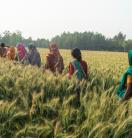Shared salinity intel builds farmer resilience
Farmers in the coastal zones of Bangladesh and West Bengal, India, are growing new crops and using new management techniques to produce more food and build their resilience to climate extremes through an ACIAR-supported project.
ACIAR Research Program Manager for Water Dr Robyn Johnston says the region is one of the most at risk from climate change in the world.
Farms in these coastal zones are exposed to salty seawater intruding on farmland and salinity affects the soil.
‘Sea level rise and extreme weather events are a problem in the area. It is also densely populated and very poor,’ said Dr Johnston.
‘We are demonstrating a wide range of options for farmers to intensify and diversify their production to help reduce their risks.’
Now, the farmers are growing a larger range of food crops and generating incomes to support their economic development and wellbeing.
The project is led by CSIRO and jointly funded by ACIAR and the Krishi Gobeshona Foundation (KGF) of Bangladesh.
‘Farmers in the region primarily grew just rice, and only in the wet season, because it was the only reliable crop to grow,’ said Dr Mohammed Mainuddin, project leader at CSIRO.
‘Their past experiences led them to believe it was impossible to grow any crops in the dry season because of a lack of freshwater for irrigation and residual salinity in the soil, so they didn’t.’
The project team has demonstrated that short-duration rice, harvested two to four weeks earlier than standard rice, can be grown during the wet season in the area.
‘It is high-yielding and, because it can be harvested sooner, it allows time for another crop to be planted that can take advantage of the available moisture before water scarcity becomes a problem in the dry season,’ said Dr Mainuddin.
A range of other crops has been tested and grown in the dry season. They include sunflower, maize, potato, garlic, watermelon, pumpkin and spinach.
‘We have also identified associated management techniques that preserve freshwater through the dry season so it can be used to support crop production,’ said Dr Mainuddin.
Managing salinity and agricultural production is a shared concern of Australia, Bangladesh and India. The collaboration and shared learnings between the countries has been central to the success of the research.
Dr Jiban Krishna Biswas, the Executive Director of KGF, said the work was of fundamental importance to Bangladesh because it targeted an area of the country where 65% of people live below the poverty line.
‘Several high yielding and short duration rice varieties have been found suitable, profitable and preferred by the farmers,’ said Dr Biswas.
‘The rice yield is around 1 tonne per hectare higher than existing varieties, generating benefits for the farmers.’
The project is supporting the adoption of new rice varieties, crops and practices through demonstration trials and farmer field days.
The project’s next phase will set up more field trials in different areas to extend the learnings to other farmers.



